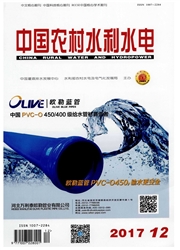

 中文摘要:
中文摘要:
针对三江平原井灌稻区利用4~5℃的井水灌溉,难以满足水稻对灌溉水温的要求,导致井灌水稻产量低、品质低、效益差的现状,通过田间试验,研究晒水池增加水温的规律、晒水池增温与其影响因素间的关系,为井灌稻区克服冷水害提供了解决方案和数量指标。结果表明:气温、晒水池面积、水深是影响晒水池水温的主要因素,尤其水温与气温的关系最为显著。水温、气温的日变化趋势具有同步性,但与气温相比,水温的变化过程具有滞后性。在晴天里,气温越高,水温越高;在一定的气温范围内,晒水池面积越大,水温越高。
 英文摘要:
英文摘要:
Because of irrigating with 4-5 ℃ of well water in well irrigation areas in Sanjiang Plain, water temperature can not meet the demand for rice growing, so well irrigated rice is low in production, quality, and benefit. Through field experiment, the paper analyzes the law of water temperature increasing in water-sunning pool, and studies the relation between water temperature increasing and its effect factors of water-sunning pool. Solution and quantitative index are put forward for resolving cold water harm in well irrigation rice areas. The results show that air temperature, area and depth of water-sunning pool are the main factors that affect water temperature; especially the relation between air temperature and water temperature is the most prominent factor. The daily change trends in water temperature and air temperature are synchronism. But compared to air temperature, the change in water temperature is lagged. In fine days, the higher the air temperature, the higher the water temperature. Within the range of air temperature, the bigger the area of water-sunning pool, the higher the water temperature.
 同期刊论文项目
同期刊论文项目
 同项目期刊论文
同项目期刊论文
 期刊信息
期刊信息
